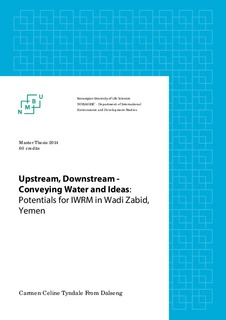| dc.description.abstract | Water Resources Management (IWRM) is a popular concept within water management today and has been widely promoted across the world. As a concept with various definitions, questions have been raised both about its actual meaning and also about its usefulness. Because of the concept’s vagueness it can be interpreted differently by different actors and might change as it is conveyed from its conception as an idea to reality on the ground.
This thesis investigates what the potential for IWRM is in Wadi Zabid, an area in western Yemen suffering from water resource troubles. To find the answers to this, a case study of IWRM and a case study of water management in Yemen have been conducted and analysed together, based on semi-structured interviews from a farming community in Wadi Zabid, and document analysis of legal and policy texts as well as the texts of organisations and secondary literature on IWRM and on water management in Yemen. The thesis analyses the concept IWRM and sees how the approach to IWRM changes as it is conveyed from idea to reality on the ground in Wadi Zabid, as well as how the structure of the concept itself affects its potential for implementation.
By investigating how IWRM is approached at four different stages of its journey from idea to reality, this thesis maps what affects the ultimate potential of IWRM in Wadi Zabid, and also shows how the concept changes. The key finding of the thesis is that the structure of IWRM can be said to affect its potential substantially. The structure of the concept builds on a normative value which I call “a new water ethic”. This new water ethic is presumed to exist at all stages for IWRM to work, but I find that this is not the case in Wadi Zabid, or in the other stages which also affect the ultimate outcome. The most important implication of this finding is that IWRM`s potential in a specific case has to be studied through the conveyance of the concept at all stages, paying close attention to the concept’s structure, if one wishes to truly understand what might work, what might not, and why. | nb_NO |
